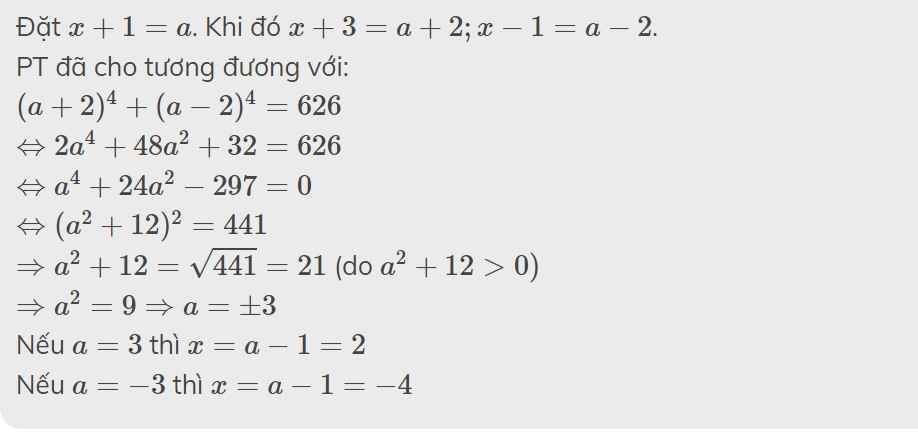
Hãy nhập câu hỏi của bạn vào đây, nếu là tài khoản VIP, bạn sẽ được ưu tiên trả lời.


(x-1)\(^3\)+ (2x+3)\(^3\)= (3x+2)\(^3\)
Đặt x-1 = a (a thuộc N*) (1)
2x + 3 =b ( b thuộc N*) (2)
=> (x-1) + (2x+3) = 3x+2
Ta có a\(^3\)+ b\(^3\)=( a+b)\(^3\)
=> a\(^3\) + b\(^3\)= a\(^3\)+ 3a\(^2\)b + 3ab\(^2\)+ b\(^3\)
=> 3a\(^2\)b + 3ab\(^2\)=0
=> 3ab(a+b) = 0
=> a=0 hoặc b = 0
+) Thay a=0 vào (1), ta có: x-1=0 <=> x=1
+) Thay b=0 vào (2) ta có 2x+3 =0 <=> x=\(\dfrac{-3}{2}\)
Vậy nghiệm của pt là 1; \(\dfrac{-3}{2}\)

a) \(x^3+6x^2+12x+8\)
\(=\left(x+2\right)^3\)
b) \(x^3-3x^2+3x-1\)
\(=\left(x-1\right)^3\)
c) \(1-9x+27x^2-27x^3\)
\(=-\left(27x^3-27x^2+9x-1\right)\)
\(=-\left(3x-1\right)^3\)

3) \(x^2-7x+6=0\)
\(\Leftrightarrow x^2-6x-x+6=0\)
\(\Leftrightarrow x\left(x-6\right)-\left(x-6\right)=0\)
\(\Leftrightarrow\left(x-6\right)\left(x-1\right)=0\)
\(\Leftrightarrow\left[{}\begin{matrix}x-6=0\\x-1=0\end{matrix}\right.\Leftrightarrow\left[{}\begin{matrix}x=6\\x=1\end{matrix}\right.\)
S=\(\left\{6;1\right\}\)
\(\)

a) \(x^4+2x^3-12x^2-13x+42=0\)
\(\Leftrightarrow x^4+3x^3-x^3-3x^2-9x^2-27x+14x+42=0\)
\(\Leftrightarrow x^3\left(x+3\right)-x^2\left(x+3\right)-9x\left(x+3\right)+14\left(x+3\right)=0\)
\(\Leftrightarrow\left(x+3\right)\left(x^3-x^2-9x+14\right)=0\)
\(x^4+2x^3+5x^2+4x-12=0\)
\(\Leftrightarrow x^4-x^3+3x^3-3x^2+8x^2-8x^2+12x-12=0\)
\(\Leftrightarrow x^3\left(x-1\right)+3x^2\left(x-1\right)+8x\left(x-1\right)+12\left(x-1\right)=0\)
\(\Leftrightarrow\left(x-1\right)\left(x^3+3x^2+8x+12\right)=0\)
\(\Leftrightarrow\left(x-1\right)\left(x^3+2x^2+x^2+2x+6x+12\right)=0\)
\(\Leftrightarrow\left(x-1\right)\left[x^2\left(x+2\right)+x\left(x+2\right)+6\left(x+2\right)\right]=0\)
\(\Leftrightarrow\left(x-1\right)\left(x+2\right)\left(x^2+x+6\right)=0\)
Ta có:
\(x^2+x+6=x^2+2.x.\dfrac{1}{2}+\dfrac{1}{4}+\dfrac{23}{4}=\left(x+\dfrac{1}{2}\right)^2+\dfrac{23}{4}>0\)
\(\Leftrightarrow\left(x-1\right)\left(x+2\right)=0\)
\(\Leftrightarrow\left[{}\begin{matrix}x=1\\x=-2\end{matrix}\right.\)
Vậy...........

a) \(x^3-7x+6=x^3+3x^2-x^2-3x-2x^2-6x+2x+6\)
=\(x^2\left(x+3\right)-x\left(x+3\right)-2x\left(x+3\right)+2\left(x+3\right)\)
=\(\left(x+3\right)\left(x^2-x-2x+2\right)\)
=\(\left(x+3\right)\left(x-2\right)\left(x-1\right)\)
=\(\left\{\begin{matrix}x+3=0=>x=-3\\x-2=0=x=2\\x-1=0=>x=1\end{matrix}\right.\)
\(b...x^3-19x+30=0\)
\(=>x^3+5x^2-2x^2-10x-3x^2-15x+6x+30=0\)
=>\(x^2\left(x+5\right)-2x\left(x+5\right)-3x\left(x+5\right)+6\left(x+5\right)=0\)
=>\(\left(x+5\right)\left(x^2-2x-3x+6\right)=0\)
=>\(\left(x+5\right)\left(x-3\right)\left(x-2\right)=0\)
=>\(\left\{\begin{matrix}x-3=0=>x=3\\x-2=0=>x=2\\x+5=0=>x=-5\end{matrix}\right.\)
Vậy x=-5;2;3

e:
Tham khảo: 
a: \(\Leftrightarrow x^2-2x+1+4x^2+4x+4-5x^2+5=0\)
\(\Leftrightarrow2x+10=0\)
hay x=-5
a,\(x\left(x+1\right)\left(x^2+x+2\right)\)
\(=\left(x^2+x\right)\left(x^2+x+2\right)\)
ĐẶT X^2+X=A\(\Rightarrow\left(x^2+x\right)\left(x^2+x+2\right)=a\left(a+2\right)=42\)
\(\Rightarrow a=\pm1,\pm2,\pm3,\pm6,\pm7,\pm42\)
SUY RA TÌM ĐC X
b,
a) \(x\left(x+1\right)\left(x^2+x-2\right)=48\Leftrightarrow\left(x^2+x\right)\left(x^2+x-2\right)=48\)
Đặt \(x^2+x=t\Rightarrow t\left(t-2\right)=48\Leftrightarrow t^2-2t-48=0\Leftrightarrow\orbr{\begin{cases}x=-8\\x=6\end{cases}}\)
Với x = -8, ta có: \(x^2+x=-8\Leftrightarrow x^2+x+8=0\) (Vô nghiệm)
Với x = 6, ta có: \(x^2+x=6\Leftrightarrow x^2+x-6=0\Leftrightarrow\orbr{\begin{cases}x=2\\x=-3\end{cases}}\)
Vậy phương trình có tập nghiệm \(S=\left\{-3;2\right\}\)
b) \(\left(x-1\right)^3+\left(2x+3\right)^3=27x^3+8\)
\(\Leftrightarrow\left(x-1+2x+3\right)\left[\left(x-1\right)^2-\left(x-1\right)\left(2x+3\right)+\left(2x+3\right)^2\right]=\left(3x+2\right)\left(9x^2-6x+4\right)\)
\(\Leftrightarrow\left(3x+2\right)\left(3x^2+9x+13\right)=\left(3x+2\right)\left(9x^2-6x+4\right)\)
\(\Leftrightarrow\left(3x+2\right)\left(3x^2+9x+13-9x^2+6x-4\right)=0\)
\(\Leftrightarrow\left(3x+2\right)\left(-6x^2+15x+9\right)=0\)
TH1: \(3x+2=0\Leftrightarrow x=-\frac{2}{3}\)
TH2: \(-6x^2+15x+9=0\Leftrightarrow\left(x-3\right)\left(-6x-3\right)=0\)
\(\Leftrightarrow\orbr{\begin{cases}x=3\\x=-\frac{1}{2}\end{cases}}\)